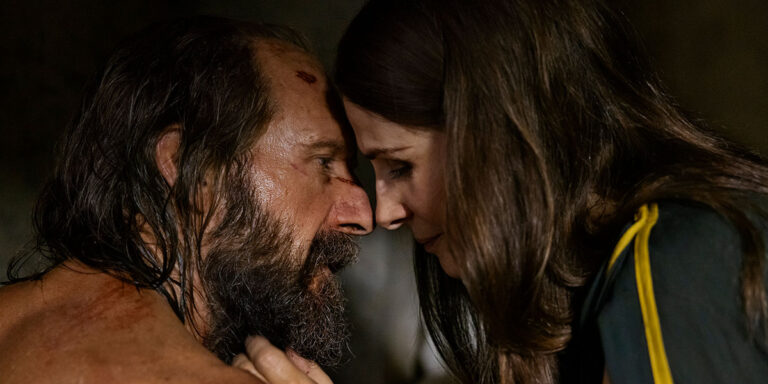
Returning home after a long time away with no communication is always uncomfortable. In the age of cell phones and emails, not being in touch feels like a deliberate choice, but in the time of the Trojan War long before the advent of modern technology, failure to send word was considerably more excusable. Literature fans will be very familiar with the story of Odysseus from Homer’s classic poem, and Uberto Pasolini’s The Return spotlights the period of the king’s return home long after almost everyone has given up on his still being alive.
The kingdom is not in good shape in Odysseus’ absence, as multiple suitors harass the queen, Penelope (Juliette Binoche), to choose one of them so that they can rule. Her son, Telemachus (Charlie Plummer), has never met his father and feels betrayed by his long absence, and no one within the court has any respect for their leaders. When a battered Odysseus (Ralph Fiennes) washes up on shore after an arduous journey back home, he is mistaken for a beggar. As the situation worsens and the most devious members of the court push Penelope to make a decision, Odysseus must decide whether he is ready to reveal his true nature.
Taken as a standalone story, this film could have been much shorter if Odysseus had merely announced and identified himself as soon as he was strong enough to speak. But that’s never how these things work, requiring considerable deception and waiting until the last possible minute to reveal the truth, and it’s also true that declaring himself too soon could have made him seem weak and open to attack. That no one – including his wife and mother – recognize him is perhaps not a stretch given how long he was away, but there’s still a sense that this narrative could have been truncated slightly to reach a similar conclusion, even if it’s not how the tale traditionally goes.
The Return is a relatively bare film that finds its characters wandering through undecorated structures and open fields, wearing just enough to keep themselves minimally clothed. It’s an understandable choice given that the story doesn’t call for lavish production design, and the starkness of the landscape adds to the bleak nature of this kingdom. Even marrying Penelope and being declared king wouldn’t truly change the fates or fortunes of any of these men, but their thirst for power is much more evident when the spoils are truly so dismal.
This is one of two films anchored by Fiennes screening at the Toronto International Film Festival this year. He’s much livelier and more present in Conclave, which is sure to be an Oscar contender, while this film asks something different from him. The wear on his face is visible not just due to the makeup applied, but felt in the way that he speaks and moves. Though, once healed from his wounds, he is quite physically able, the sixty-one-year-old actor easily looks and seems a decade or two older thanks to the way in which Fiennes embodies him.
It’s always good to see Binoche in any role, though this film doesn’t give her the opportunity to do her best work. Similarly, the talented young Plummer, seen recently in National Anthem, doesn’t get much to do with Telemachus other than to express resentment towards his father and those who despise and mock him. Devotees of Homer and The Odyssey will likely enjoy this film, but those less attuned to that mythology may find it standard and uninvolving. This is a worthwhile story about fatherhood, family, and community, but this adaptation doesn’t dig too deep to reveal anything new about an ancient and widely-read tale.
Grade: C+
Check out more of Abe Friedtanzer’s articles.
The Return makes its world premiere in the Gala Presentations section at the 2024 Toronto International Film Festival.

